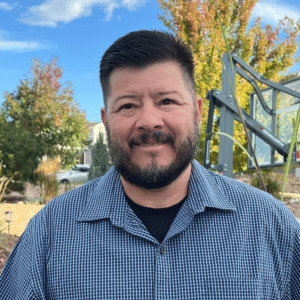Self-reflection is a practice that allows you to stake a step back and examine your thoughts, feelings, and behaviors. It does NOT involve staring at yourself in the mirror (free dad joke for you). Self-reflection can help you gain a better understanding of yourself, promote prayer and mindfulness, and improve your relationships with others. Especially when done with a top-notch Christian counselor.
Sounds awesome. But how do you actually practice self-reflection, especially when you’ve got an extremely busy life? Great question.
When we look at our future selves and picture our goals, we often think it’s not possible to go from where we’re at, to where we want to be. Unfortunately, nobody can leap that far in time (or at all, probably), but by focusing on ONE small thing you can do today, the end result doesn’t seem so daunting.
Alright, what’s the point? The point is, even with a busy schedule, you can start by simply taking 5 minutes each day to pray, meditate, journal (there are tons on Amazon), or anything else that allows you to focus on your thoughts and feelings without distractions. Experiment with different methods until you find one you love. I have a 4-year old and twin 2-year olds, and completely get how hard it can be to find time for self-reflection.
A variety of self-reflection studies and articles have been published in recent years, and each one points to the fact that the practice has numerous long-term benefits. Self-reflection can improve emotional intelligence, a greater understanding of your relationships, your ability to learn new things, and many more benefits.
“Do not be conformed to this world, but be transformed by the renewal of your mind, that by testing you may discern what is the will of God, what is good and acceptable and perfect.”
– Romans 12:12 (NIV)
When reflecting, it’s important to be honest with yourself. Self-reflection requires vulnerability, and you should not be afraid to examine your flaws and mistakes. Use them as opportunities for growth and improvement. By examining your past behaviors and thought patterns, you can identify areas where you may need to make changes or adjustments. For example, if you notice that you tend to react negatively to certain situations, you can work on developing more positive coping mechanisms.
Another benefit of self-reflection is that it promotes mindfulness and prayer, which is the practice of being fully present and engaged in the present moment. When you’re in prayer, you’re less likely to get caught up in worries or distractions, and you’re better able to focus on the task at hand. When practicing self-reflection, try to stay present and avoid dwelling on the past or worrying about the future. Focus on the here and now.
In addition to these benefits, self-reflection can also improve your relationships with others. When you’re more self-aware, you’re better able to understand and empathize with others’ perspectives. This can help you communicate more effectively and build stronger, more meaningful connections with others.
4 Questions to Ask Yourself:

Not THAT reflection.
What are my values and beliefs?
How have my experiences shaped who I am today?
What are my strengths and weaknesses?
What are some areas of my life where I want to grow and improve?
These questions can help you gain a better understanding of yourself and your actions.
It should be pretty obvious by now that self-reflection is a powerful tool for personal growth and self-awareness. When combined with clinically excellent Christian counseling, you can identify areas for improvement and make positive changes in your life. So try to find SOME way to squeeze in those 5 minutes. Reflect, be honest with yourself, focus on the present moment, and watch as you grow and improve from within.
SOURCES
Click to Expand
- Tran, V., & Nguyen, N. (2021). The role of self-reflection in enhancing academic performance: A systematic review. Higher Education Research & Development, 40(5), 949-967.
- Jordan, J. V. (2019). The power of self-reflection for leaders. Journal of Leadership Studies, 13(4), 11-16.
- Harris, C. B., & Thompson, C. (2021). The benefits of self-reflection for mental health and wellbeing during the COVID-19 pandemic. Journal of Mental Health, 30(3), 279-283.
- Lianekhammy, J., & Singh, M. (2020). The impact of self-reflection on student learning outcomes in higher education. Journal of Education and Learning, 9(1), 87-99.
FINDING A CHRISTIAN THERAPIST
Research shows that much of the change people experience during their time in therapy is because they felt heard and understood by their therapist–that their therapist “got them” and that the guidance they gave was relevant and applicable. Because of this, it is critical that you find a therapist whom you can connect with, whom you feel comfortable with, whom you feel “gets you.” Therefore, we encourage you to take a few minutes to read a little about each one of our therapists. If you prefer to look at the counselors nearest to you, please click the office location buttons below. Otherwise, you can meet with any of our Christian Counselors online from the comfort of your own home. If you have questions about any of them, please contact us!












